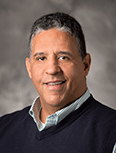 Ben Fontes, EHS senior associate director and biosafety officer, has spent his career sharing his knowledge with those around the globe in need of assistance in the biosafety field. His latest mission took him to Kota Kinabalu, the state capital of Sabah, Malaysia, for a visit to the Kota Kinabalu Public Health Laboratory to help establish biosafety and biosecurity laboratories to diagnose highly infectious pathogens such as COVID-19 and SARS.
Ben Fontes, EHS senior associate director and biosafety officer, has spent his career sharing his knowledge with those around the globe in need of assistance in the biosafety field. His latest mission took him to Kota Kinabalu, the state capital of Sabah, Malaysia, for a visit to the Kota Kinabalu Public Health Laboratory to help establish biosafety and biosecurity laboratories to diagnose highly infectious pathogens such as COVID-19 and SARS.
During this event, senior ‘twins” from the United States were asked to help facilitate institutional twinning between Australia and Thailand/Malaysia. Each of the three twin groups at this event had representation from a senior twin facilitator such as Fontes, a “new” Australian twin mentor who is learning how to run the program, and two representatives from an institution paired with a sister lab in Australia.
Read the article on the visit in the Borneo Post.
Fontes is part of the Biorisk Management Advisor Development and Mentorship Program, informally known as the “Biosafety Twinning Program”. The program was developed 14 years ago by the Sandia National Laboratories Global Chemical Biological Security team as a way for experienced biosafety professionals to mentor newly appointed or inexperienced members of the biosafety field in countries where biorisk management concepts and principals are relatively new. He has been partnered with “twins” from Yemen, Kurdistan Regional Governate of Iraq, Morocco, Egypt, Tanzania, and Turkey.
In 2019, several “twins” from Algeria and Mali along with biosafety professionals from Vietnam visited Yale University to get a first-hand look at its biosafety practices. They heard presentations from Yale researchers, toured various labs and biosafety-related areas and attended a Biosafety Level 3 training as well as more detailed breakout information sessions. Yale also served as a peer institutional twin to Al Muthanna University in Iran during the pandemic.